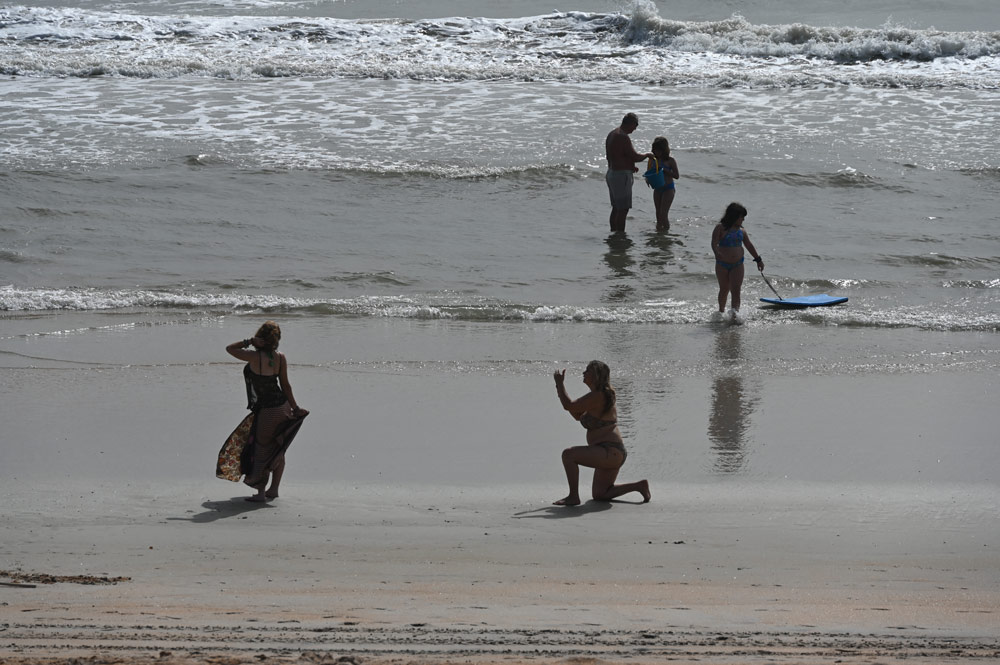By Beaulieu, Marie-Claire
As part of our summer holidays, many of us are going to the beach to relax and soak up the sun. According to research, many people find that spending time at the beach greatly relaxes them. The warmth of the sand envelops us, the scent of the breeze calms us, staring at the ocean induces a moderate meditative state, and most importantly, the constant, regular sound of the waves lets us completely unwind.
However, beach vacations only gained popularity as a component of the wealthy’s lifestyle in Western nations in the late 19th and early 20th centuries. The seashore was seen by early Europeans, particularly the ancient Greeks, as a site of death and suffering. They were seafaring people who lived largely on the shore, but they were afraid of the water and believed that an agricultural way of life was more honorable and safer.
As a cultural historian and a specialist in Greek mythology, I find this shift in perspective toward the beach to be intriguing.
The sensory experience of the beach
Greek literature emphasizes the unease the ancient Greeks felt about the beach and the sea in general by downplaying all the pleasant feelings and emphasizing the negative ones, as I describe in my 2016 book, The Sea in the Greek Imagination.
For example, the strong odor of seaweed and sea brine is emphasized in Greek literature. The hero Menelaus and his friends get lost close to the Egyptian coast in the Odyssey, an epic written in the ninth century BCE that is mostly set at sea. To capture the sea deity Proteus and learn how to return home from him, they have to conceal beneath seal skins. Only magical ambrosia placed beneath their noses can counteract the stench of the seals and sea brine, which is so repugnant to them that their ambush nearly fails.
In a similar vein, although many people find the sound of waves to be soothing on a quiet day, the ferocity of storms at sea can be upsetting. Ancient Greek literature compares the sounds of war to the terrifying might of stormy waves. The Trojan army’s assault on the Greek battlefield is likened to a storm at sea in the Iliad, a poem written contemporaneously with the Odyssey: They advanced like a deadly storm that scours the earth to Father Zeus’ thunder and stirs the sea with stupendous roaring, leaving surging waves in their path over the echoing waters, serried ranks of great arched breakers white with foam.
Lastly, exposure to the sun and sea salt turns even the attractive Odysseus ugly and frightening. On his voyage home from the Trojan War, this hero spends ten years at sea in the Odyssey. At the end of his ordeal, the enraged sea god Poseidon sends a storm, and he is barely clinging to a raft. He eventually lets go and swims to shore, frightening the Princess Nausicaa’s attendants with his burnt, brine-befouled skin when he lands on the island of the Phaeacians.
In contrast to the fields’ productivity, the sea and beach sand were considered to be sterile. Because of this, the sea is frequently referred to as atrygetos, which means unharvested, throughout the Iliad and Odyssey.
Naturally, this idea that the water is sterile is contradictory, as the seas provide around 2% of the total calories and 15% of the protein consumed by humans, and they may provide considerably more. Even the Greeks eat a lot of fish, and several kinds were considered to be exclusive to the wealthy.
Death at the beach
The seashore was feared and associated with death in ancient Greek literature, and it was even customary to grieve for departed loved ones there.
Cenotaphs, or empty graves intended to honor individuals who perished at sea and whose corpses could not be retrieved, were among the many tombs found by the sea.
In the ancient world, this was an especially harsh fate because those who were unable to be buried were destined to live on Earth forever as ghosts, while those who were given appropriate funerals would enter the underworld. Because it was dank and dismal, the Greek underworld was not a particularly nice place to be, yet it was seen as the honorable way to die.
Thus, the beach served as a liminal area in Greek society, a bridge connecting the realms of the living and the dead, as classical scholar Gabriela Cursaru has demonstrated.
Revelation and transformation
For the Greeks, however, the beach was not entirely unpleasant. The Greeks believed that the beach served as a bridge between the worlds of the living, the dead, and the gods since it connected the sea and the land. As a result, the beach might provide divine visions, revelations, and omens.
Because of this, there were a lot of oracles of the dead on seaside cliffs and beaches where the living could get knowledge from the dead.
The seashore was also frequented by the gods. They occasionally even made an appearance to their devotees on the seashore after hearing prayers. The deity Apollo overhears his priest Chryses griping on the beach about the Greeks’ mistreatment of his daughter in the Iliad. Returning the girl to her father is the only way to prevent the Greek army from succumbing to the plague, which the enraged deity promptly unleashes in retaliation.
In addition to these religious convictions, the beach served as a tangible link between Greece and other countries.
Ancient ships had the capacity to remain at sea for extended periods of time, therefore pirates, traders, and enemy fleets were all likely to land on beaches or visit the coasts. According to military historian Jorit Wintjeshas, the seashore may be a really dangerous area in this regard.
On the plus side, flotsam from shipwrecks may offer delightful surprises, such unanticipated treasure, which is a pivotal moment in many Greek myths. For instance, the poor goatherd Daphnis finds a purse on the beach in the classic romance Daphnis and Chloe, which enables him to marry Chloe and bring their love story to a happy ending.
Maybe some remnants of this idea of the beach still exist today. A lot of individuals still enjoy beachcombing, and some even use metal detectors. Beachcombing reflects the enduring human interest with the sea and all of its hidden treasures, from shells and sea glass to Spanish gold coins, in addition to its proven favorable psychological effects.
The seashore might give us the impression that we are on the verge of another world, just as it did for the Greeks.
![]()
Marie-Claire Beaulieu teaches classical studies at Tufts University as an associate professor.







